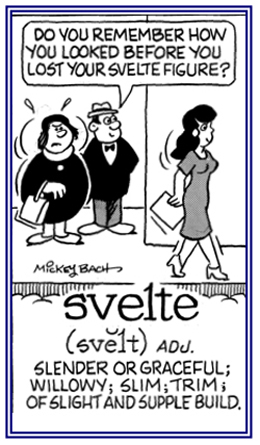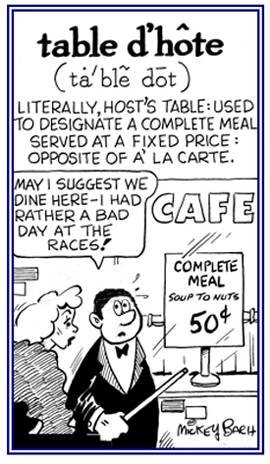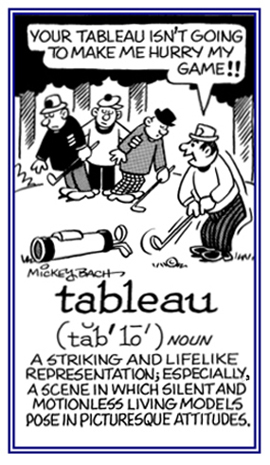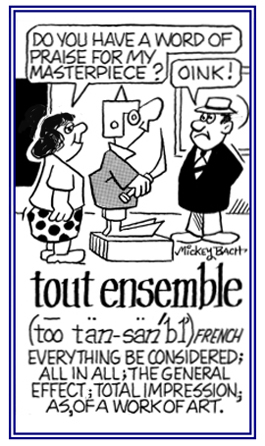Words of French origin
(Many words from French are used in English)
An object associated with memories of an even, person, etc.: One of the shelves in Katherin's bedroom is filled with souvenirs which she bought while on her extensive travels abroad.
svelte (adjective), more svelte, most svelte
1. Descriptive of someone who is lithe, slender and of small build: The new fashions of the year emphasize Claudia's svelte and slim figure.
2. Etymology: from Latin ex-, "out" + vellere "to pluck, to pull, to stretch."

© ALL rights are reserved.
Go to this Word A Day Revisited Index
2. Etymology: from Latin ex-, "out" + vellere "to pluck, to pull, to stretch."

Go to this Word A Day Revisited Index
so you can see more of Mickey Bach's cartoons.
1. A complete meal with selected courses plus a few other options of food that are offered at a set price: At the restaurant where Jim and Mary were, there was a delicious table d'hote which was not very expensive!
2. The lunch or dinner provided for everyone at a specific time and at a fixed amount: At the guest house where Ingrid and Joe were staying during their vacation, a table d'hote was served by the hosting family and all the guests sat at one table and chatted about the nice countryside.
3. Etymology: a French phrase that literally means "the host's table" or "the table of the host".

© ALL rights are reserved.
Go to this Word A Day Revisited Index
2. The lunch or dinner provided for everyone at a specific time and at a fixed amount: At the guest house where Ingrid and Joe were staying during their vacation, a table d'hote was served by the hosting family and all the guests sat at one table and chatted about the nice countryside.
3. Etymology: a French phrase that literally means "the host's table" or "the table of the host".
The term is used to denote a table that is set aside for residents of a guesthouse, who presumably sit at the same table as their host.

Go to this Word A Day Revisited Index
so you can see more of Mickey Bach's cartoons.
1. A depiction of a scene that is usually presented on a stage by silent and motionless costumed participants: Every Christmas, Mrs. Downing put up the tableau portraying the nativity scene of Jesus along with the shepherds; plus Mary and Josef.
2. Etymology: from Latin tabula, "a painting"; from French tableau, "a picture, a painting."

© ALL rights are reserved.
Go to this Word A Day Revisited Index
2. Etymology: from Latin tabula, "a painting"; from French tableau, "a picture, a painting."

Go to this Word A Day Revisited Index
so you can see more of Mickey Bach's cartoons.
An approach or method of doing something that requires skill and training: Francis demonstrated a marvellous technique and style when she played the sonatas on the piano.
1. A headpiece made of artificial or real hair in order to cover up a bald spot, usually on a man's head: Mr. Jackson bought a small toupee, or wig, in an attempt to disguise the bare area on his skull!
2. Etymology: from French toupet, "small tuft of hair, a forelock; as, "the toupée, the curl or lock of hair at the top of the cranium."

© ALL rights are reserved.
Go to this Word A Day Revisited Index
2. Etymology: from French toupet, "small tuft of hair, a forelock; as, "the toupée, the curl or lock of hair at the top of the cranium."

Go to this Word A Day Revisited Index
so you can see more of Mickey Bach's cartoons.
1. A magnificent feat or accomplishment: France won the World Cup in 2018 and winning it could be considered to be France's tour de force in the international soccer or European football tournament of that year!
2. Etymology: from French, "a significant feat of strength."

© ALL rights are reserved.
Go to this Word A Day Revisited Index
2. Etymology: from French, "a significant feat of strength."

Go to this Word A Day Revisited Index
so you can see more of Mickey Bach's cartoons.
A temporary bandage applied tightly to a wound to stem bleeding until further medical treatment is administered: The paramedic who arrived at the scene of the car accident used a tourniquet for the injured arm of one of the victims.
1. Diverse components creating one concept or one unit: The tout ensemble of Adam's piece of art was composed of dried flowers, sea shells, twigs, and sand, and then covered with resin.
2. An impression or effect produced by something made of separate parts; outward appearance: The outfit Mr. Simmons wore created a tout ensemble, which excited notice and aroused many comments among the other guests at the special ceremony.
3. Etymology: from French tout, "all" + ensemble, "together."

© ALL rights are reserved.
Go to this Word A Day Revisited Index
2. An impression or effect produced by something made of separate parts; outward appearance: The outfit Mr. Simmons wore created a tout ensemble, which excited notice and aroused many comments among the other guests at the special ceremony.
3. Etymology: from French tout, "all" + ensemble, "together."

Go to this Word A Day Revisited Index
so you can see more of Mickey Bach's cartoons.
A short bar of wood or metal tied between parallel ropes and suspended over an open space, usually used by circus performers or gymnasts to swing between two locations: On the posters advertising the circus, the trapeze was described as death defying, dangerous, and exciting.
triage (adjective) (not comparable)
Descriptive of the allocation and sorting of issues, problems, or patients: Greg decided to triage his homework assignments of the different subjects according to the dates they were due.
The process of determining immediacy and priority for treatment among ill or injured persons in a hospital or medical assistance location: The doctors in the clinic arranged to have a triage carried out by the nurses so that the patients who needed prompt attention were taken care of first.
triage (verb), triages; triaged; triaging
To prioritise issues, problems, or patients: Jack triaged his assignments for homework for the different subjects according to the dates they were due.
A wandering singer or poet, who entertained others with love songs, and frequently referred to in the 12th and 13th century literature: The troubadours strolled from city to city, earning their living by writing and performing music of a romantic nature.
A band or group of performers, including dancers, musicians, and singers, traveling from place to place seeking employment and amusing the local people: When the troupe arrived in the city, the children were all excited to see the actors present the latest stage show.


